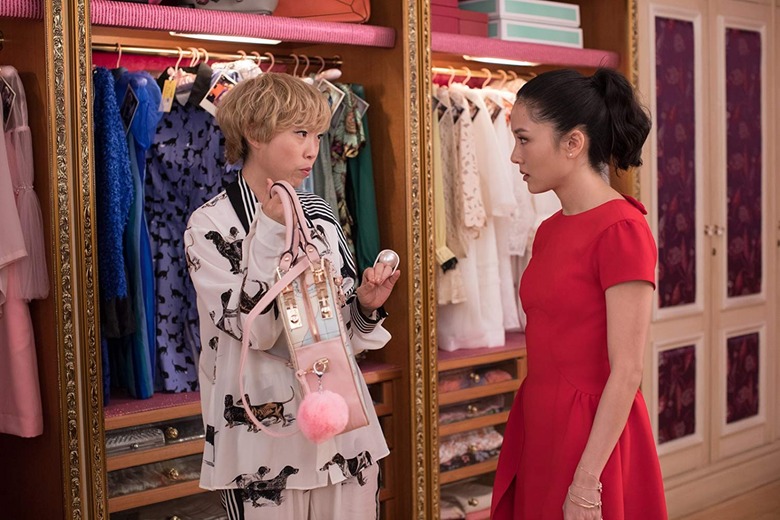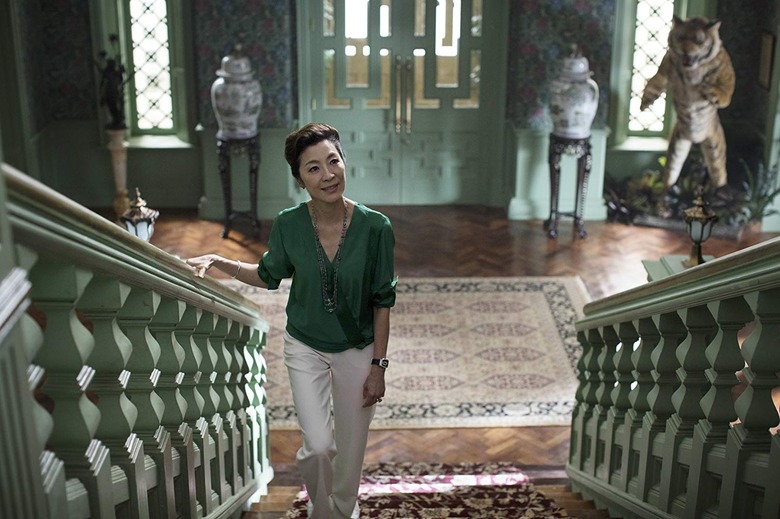What 'Crazy Rich Asians' Gets Right About Asian-American Identity
When American-born Rachel Chu (Constance Wu) meets her boyfriend Nick's mother Eleanor Young (Michelle Yeoh) for the first time at their lush Singaporean mansion in Crazy Rich Asians, she enthusiastically lists off her accomplishments: lauded economics professor at NYU, talented, brilliant, probably played piano since elementary school. It's a check list that any Asian-American parent would beam at, but to which Eleanor only coolly responds, "Pursuing one's passion...how American."
This fleeting confrontation toward the beginning of the film perfectly illustrates the divide between Asians and Asian-Americans that both communities still try to navigate today. And surprisingly, Crazy Rich Asians' conflict between filial piety and passion gets to the heart of the muddled, ill-defined Asian-American identity.
At first glance, Crazy Rich Asians doesn't seem to be about Asian-Americans at all. The only significant Asian-American character is our heroine Rachel Chu, a Chinese-American economics professor whose likable everywoman vibe practically oozes out of her mom's homemade lunches and her practical "Gap look." The rest of the cast is made up almost entirely of homegrown Singaporeans who live and breathe in an exclusive sphere of wealth and opulence. They live in a world so unlike what we've seen of Asians onscreen, yet so familiar: one of jet-setting lifestyles, priceless jewelry, and extravagant parties.
But it immediately becomes clear that Crazy Rich Asians is as much about a clash of cultures as it is about a clash of classes.
Kind of Like a Banana
"She thinks you're some kind of unrefined banana—yellow on the outside, white on the inside," Awkwafina's Peik Lin tells Rachel after her spectacularly awful first meeting with Eleanor.
That's a common piece of slang that plenty of Asian-Americans are familiar with — I first heard it in high school when my friends would wryly refer to how "American" we were, whether it be related to sports, grades, or just the way we speak. That innocent piece of fruit became a symbol for the growing cultural rift between us and our parents. If we hung out mostly with white kids, we were a banana. If we refused our smelly homemade lunches and instead waited in line for dry tater tots, we were a banana. If we didn't speak Vietnamese or Chinese or Japanese at home until we nearly forgot the language, we were a banana. It was our self-deprecating way of grappling with our perceived differences with our parents, who were mostly first-generation immigrants to this country and had gone through untold struggles and sacrifices to give us our comfortable middle-class lifestyles.
Those sacrifices are the stories we've typically seen on the big screen (in the rare instances that Asians get the Hollywood treatment), but not what those sacrifices yielded. But life as a modern Asian-American is nothing quite so dramatic as those of our parents, which is probably why we haven't seen it depicted on screen so much. The only thing we struggle with is the feeling of being an outsider in both America and in the homeland, and fragmented identities don't really make for great cinema. But Crazy Rich Asians manages to touch on it, even while it parades around in Gucci and Chanel.
In Crazy Rich Asians, the banana takes on another level of insult: that Rachel is not just Asian-American, but wholly American. To the wealthy Singaporean, Rachel is as American as apple pie, her Chinese heritage notwithstanding. Her values and behavior are as American as can be — first with her "passion" as Eleanor says, and in the way that she greets Eleanor with an awkward hug. In the flashy first montage that introduces us to the gossipy world of the Singaporean elite, one of Nick's former inner circle spies Rachel at a restaurant and condescendingly comments, "I think she's ABC," referring to the Singaporean vernacular for "American-born Chinese."
Even Rachel's mother (Tan Kheng Hua) tells her that while she may look Chinese and speak the language, at heart she is American. In Kevin Kwan's novel upon which the movie is based, Rachel's friend notes that before Nick, she never dated Asian guys. There's a degree of self-loathing in Rachel's experience as an Asian-American — a need to both reject and embrace the culture of a mainland that she never knew. And amazingly, the central arc of Crazy Rich Asians is not built around the love story between Rachel and her Ken doll of a boyfriend Nick Young (Henry Golding), but around her grappling with this cultural identity.
Love or Loyalty
In the second (!) significant dumpling stand-off of the summer, Rachel is surprised to learn that Eleanor wasn't just a pampered housewife but a former career woman like her — and a law student at that. But Eleanor contradicts her, telling Rachel that she dropped out of university as soon as she married Nick's father to help run his business and raise a family. "For me, it was a privilege," Eleanor says coldly. "But for you, you may think it's old-fashioned. But all this doesn't just happen. It's because we know to put family first."
But even Eleanor, for all her intimidation techniques against Rachel, is just another wallflower to her own mother-in-law (Lisa Lu), who breezily criticizes the dumplings that Eleanor made. It's this cycle of filial piety and the strain that it puts on family that becomes the core conflict of Crazy Rich Asians, and perhaps the part that speaks loudest to Asian-Americans. Stuck between loyalty to family traditions and love for a new culture, Asian-Americans can be outsiders to both. Rachel, who has never ventured further east than Queens, goes through a journey coded to every Asian-American experience. That of returning to the homeland and finding herself a foreigner in every way. Where back home she would forever be just Chinese, in Singapore, she would always be "the American." But in the end, Rachel (kind of) manages to reach some kind of cultural — and social — compromise. Because, Crazy Rich Asians seems to ask, why can't we have both?
Fittingly, I went to see Crazy Rich Asians with my mom, who was even more excited and jubilant than I was. She had seen The Joy Luck Club 25 years ago, and had caught The Wedding Banquet in theaters. Crazy Rich Asians was a long time coming. She gasped at the film's similarities to the Korean dramas that she adored, and admired the sweeping shots of the Singaporean — er — Malaysian skyline (though set in Singapore, Crazy Rich Asians was shot in Malaysia). After we left the theater, she commented that Crazy Rich Asians made her want to visit Malaysia again, but this time as a tourist. "Oh yeah," I remembered, "you lived there for a few months in the refugee camp." The weight of my mom's past sat with me even as we gushed about the delectable street food and haute couture fashion of the film. Maybe this is what Crazy Rich Asians was saying about the Asian and Asian-American experience: that you can let it shape you, but not control you.


